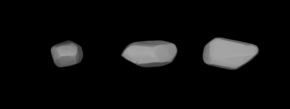367 Amicitia
 A three-dimensional model of 367 Amicitia based on its light curve | |
| Discovery | |
|---|---|
| Discovered by | Auguste Charlois |
| Discovery date | 19 May 1893 |
| Designations | |
| (367) Amicitia | |
Named after | friendship |
| 1893 AA | |
| Main belt | |
| Orbital characteristics[1] | |
| Epoch 31 July 2016 (JD 2457600.5) | |
| Uncertainty parameter 0 | |
| Observation arc | 110.06 yr (40199 d) |
| Aphelion | 2.43145 AU (363.740 Gm) |
| Perihelion | 2.00750 AU (300.318 Gm) |
| 2.21948 AU (332.029 Gm) | |
| Eccentricity | 0.095505 |
| 3.31 yr (1207.7 d) | |
| 183.800° | |
| 0° 17m 53.077s / day | |
| Inclination | 2.94143° |
| 83.4555° | |
| 55.5396° | |
| Physical characteristics | |
| Dimensions | 19.13±1.6 km |
| 5.055 ± 0.001 h (0.210625 ± 4.2×10−5 d)[2] | |
| 0.2535±0.050 | |
| 10.6 | |
367 Amicitia is a typical Main belt asteroid[1] that is a member of the Flora family.[2] It was discovered by Auguste Charlois on 19 May 1893 in Nice.
Amicitia is Latin for Friendship.
References
- ^ a b "367 Amicitia (1893 AA)". JPL Small-Body Database. NASA/Jet Propulsion Laboratory. Retrieved 11 May 2016.
- ^ a b Kryszczynska, A.; et al. (October 2012). "Do Slivan states exist in the Flora family?. I. Photometric survey of the Flora region". Astronomy & Astrophysics. 546: 51. Bibcode:2012A&A...546A..72K. doi:10.1051/0004-6361/201219199. A72.
{{cite journal}}: CS1 maint: postscript (link)
External links
